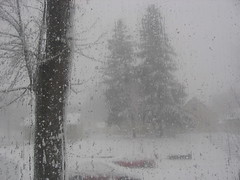It's hard to believe that I am having a weekend without Montaigne. Today begins Emerson, and how different he is. Montaigne was casual, full of stories and rather chatty. Emerson is formal, abstract and declamatory. I guess that's what a Harvard education and being a preacher for a number of years will get you. I don't much like his voice at the moment, but I wasn't sure about Montaigne when I began reading him either.
I don't know much about Emerson, nor, other than a couple essays while in school, have I read him before. So this will be an enterprise of discovery. I'm beginning with Representative Men which was first published in 1850. My edition is the Modern Library edition. The editors used the version published in 1857 which had some editorial changes made by Emerson. At this point I do not know if I will wend my way through all of Emerson's essays or just what appears in The Essential Emerson. But I have time to decide. First there is Representative Men.
To give the book a little context, 1850, the year it was published, also saw the publication of Hawthorne's The Scarlet Letter. And it is the year California became a state. Representative Men is the result of a set of lectures Emerson delivered to enthusiastic crowds several years earlier. The book received only tepid reviews. Emerson apparently joked, "The fate of my books is like the impression of my face. My acquaintances, as long back as I can remember, have always said, 'Seems to me you look a little thinner than when I saw you last.' "
But in spite of the lack of critical acclaim, it sold well. Emily Dickinson even read it and called it "a little granite book you can lean on." Eventually the book would become one of his most popular works, beloved by the likes of Carlyle, Robert Frost, and Borges.
There was some ado made about the exclusion of Americans from the book. Emerson did it deliberately, believing American lives to be "somewhat poor and pallid." He thought the likes of Franklin and Washington had no "fiery grain." It is unfortunate that he felt this way. But then, American culture didn't really come into it's own until the 20th century, and for better or worse, it now seems to be making inroads everywhere.
Today belongs to the first lecture in which Emerson discusses the uses of great men. All great men perform a service: the direct service of their actions and discoveries and the indirect service of their ideas. But however great a man is, he is not sprung up from nothing but the result of all the great men that came before. Even if one is not great, there is still a sort of debt, "Every ship that comes to America got its chart from Columbus. Every novel is a debtor to Homer. Every carpenter who shaves with a foreplane borrows the genius of a forgotten inventor. As Walt Whitman might say, we contain multitudes.
A quality of greatness is imagination:
When this wakes, a man seems to multiply ten times or a thousand times his force. It opens the delicious sense of indeterminate size, and inspires an audacious mental habit. We are as elastic as the gas of gunpowder, and a sentence in a book, or a word dropped in conversation, sets free our fancy, and instantly our heads are bathed with galaxies, and our feet tread the floor of the Pit.
The imagination of the great, awakens the imagination in all of us.
And it is important to associate with the great, to be influenced by their imaginations. If we hang out with the mediocre, our thoughts will never go beyond. But the great will take our thoughts higher and help use transcend fashion to savor universal ideas.
There is danger, however, in the term
great men. It implies caste. Emerson believes there is no such thing as a common man. He insists, "all men are at last of a size; and true art is only possible, on the conviction that every talent has its apotheosis somewhere." Heroes happen because they have a quality and talent that is demanded by the times in which they live. He can come from anywhere. But no famous or great man, no hero, is ever the essence of what we are looking for; he is only an "exhibition" of "new possibilities."
Greatness does not go on forever, "every hero becomes a bore at last." We learn that even genius has limits and faults. The man may no longer capture our attention but his qualities and his ideas continue to have an effect, "great men exist that there may be greater men."
Representative Men examines six great men, six men Emerson believes are exhibitions of the possible.
Next week: "Plato; Or, The Philosopher"




